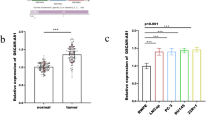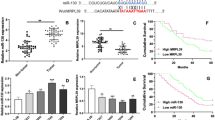Abstract
Introduction
Colorectal cancer is one of the common malignant tumors in humans, and the incidence rate is gradually increasing year by year. Survivin and CD44v3 are ideal targets for gene therapy due to their overexpression in colorectal cells. Studies show that downregulation of survivin could promote apoptosis and depress proliferation, and reduction of CD44v3 expression could inhibit tumor invasive capacity. It is difficult to achieve satisfactory curative effect.
Objective
In this study, we use survivin and CD44v3 short hairpin RNAs (shRNA) combined transfection into colorectal cancer cell line SW480 to investigate its effects on the cell apoptosis, proliferation and invasiveness.
Methods
ShRNA plasmids targeting survivin and CD44v3 were singly or co-transfected into SW480 cells.
Results
The co-transfection group exhibited the most significant inhibitory effect on cell growth (P < 0.05) and the highest apoptosis rate (P < 0.05). In addition, the invasive capacity in the co-transfected group was the least. The tumor inhibition rate of the cotransfected group in xenograft tumor mice was significantly higher than other groups (P < 0.05). Moreover, the microvessel density of the co-transfected group was significantly decreased compared with other groups (P < 0.05).
Conclusion
These results suggest combined transfection of survivin shRNA and CD44v3 shRNA may produce a synergistic effect on gene therapy in colorectal cancer.








Similar content being viewed by others
References
Kasschau KD, Carrington JC. A counterdefensive strategy of plant viruses: suppression of post transcriptional gene silencing. Cell. 1998;95:461–470.
Lin LJ, Zheng CQ, Jin Y, Ma Y, Jiang WG, Ma T. Expression of survivin protein in human colorectal carcinogenesis. World J Gastroenterol. 2003;9:974–977.
Kim PJ, Plescia J, Clevers H, Fearon ER, Altieri DC. Survivin and molecular pathogenesis of colorectal cancer. Lancet. 2003;362:205–209.
Kuniyasu H, Oue N, Tsutsumi M, Tahara E, Yasui W. Heparan sulfate enhances invasion by human colon carcinoma cell lines through expression of CD44 variant Exon3. Clin Cancer Res. 2001;7:4067–4072.
Kopp R, Fichter M, Schalhorn G, Danescu J, Classen S. Frequent expression of the high molecular, 673-bp CD44v3, v8–10 variant in colorectal adenomas and carcinomas. Int J Mol Med. 2009;24:677–683.
Kuniyasu H, Chihara Y, Kubozoe T, Takahashi T. Co-expression of CD44v3 and heparanase is correlated with metastasis of human colon cancer. Int J Mol Med. 2002;10:3.
Zaffaroni N, Pennati M, Daidone MG. Survivin as a target for new anticancer interventions. J Cell Mol Med. 2005;9:360–372.
Kopp R, Fichter M, Assert R, Pfeiffer AF, Classen S. Butyrate-induced alteration of phosphoinositide metabolism, protein kinase C activity and reduced CD44 variant expression in HT-29 colon cancer cells. Int J Mol Med. 2009;23:639–649.
Tanaka K, Iwamoto S, Gon G, Nohara T, Iwamoto M, Tanigawa N. Expression of survivin and its relationship to loss of apoptosis in breast carcinomas. Clin Cancer Res. 2000;6:127–134.
Sarela AI, Macadam RC, Farmery SM, Markham AF, Guillou PJ. Expression of the antiapoptosis gene, survivin, predicts death from recurrent colorectal carcinoma. Gut. 2000;46:645–650.
Turley EA, Noble PW, Bourguignon LY. Signaling properties of hyaluronan receptors. J Biol Chem. 2002;277:4589–4592.
Knudson W, Chow G, Knudson CB. CD44-mediated uptake and degradation of hyaluronan. Matrix Biol. 2002;21:15–23.
Altieri DC. Survivin and apoptosis control. Adv Cancer Res. 2003;88:31–52.
Castedo M, Perfettini JL, Roumier T, Andreau K, Medema R, Kroemer G. Cell death by mitotic catastrophe: a molecular definition. Oncogene. 2004;23:2825–2837.
Wheatley SP, Henzing AJ, Dodson H, Khaled W, Earnshaw WC. Aurora-B phosphorylation in vitro identifies a residue of survivin that is essential for its localization and binding to inner centromere protein (INCENP) in vivo. J Biol Chem. 2004;279:5655–5660.
Kuniyasu H, Chihara Y, Kubozoe T, Takahashi T. Co-expression of CD44v3 and heparanase is correlated with metastasis of human colon cancer. Int J Mol Med. 2002;10:333–337.
Miyazaki T, Atarashi Y, Yasumura S, et al. Fas-associated phosphatase-1 promotes Fas-mediated apoptosis in human colon cancer cells: novel function of FAP-1. Gastroenterol Hepatol. 2006;21:84–91.
Kim KS, Kim DS, Chung KH, et al. Inhibition of angiogenesis and tumor progression by hydrodynamic cotransfection of angiostatin K1–3, endostatin, and saxatilin genes. Cancer Gene Ther. 2006;13:563–571.
Zheng C, Lin L, Ma Y, Jiang W, Ma T, Hu G. Expression of survivin protein during pathogenesis of human colon mucosa. World Chin J Digestol. 2002;10:1052–1053.
Lin LJ, Zheng CQ, Jin Y, Ma Y, Jiang WG, Ma T. Expression of survivin protein in human colorectal carcinogenesis. World J Gastroenterol. 2003;9:974–977.
Watson AJ. An overview of apoptosis and the prevention of colorectal cancer. Crit Rev Oncol Hematol. 2006;57:107–121.
Rödel F, Hoffmann J, Grabenbauer GG, et al. High survivin expression is associated with reduced apoptosis in rectal cancer and may predict disease-free survival after preoperative radiochemotherapy and surgical resection. Strahlenther Onkol. 2002;178:426–435.
Liu Z, Zheng C, Yu W. Impact of survivin shRNA on proliferation and cell cycle of colon cancer SW480 cells. J Oncol. 2008;14:186–189.
Xiong Y, Wang A, Guo W. Biological behavior of colorectal carcinoma Lovo cells after stable transfection of survivin-targeting shRNA expression vector. J Chin Pract Diagn Ther. 2009;23:741–743.
Leng S, Liu Y, Zhao H, Sun G, Wang R. Inhibition of gastric cancer BGC-823 cell proliferation by small interfering RNA specific to survivin gene in vitro. Chin J Microecol. 2010;22:805–807.
Ai Z, Feng Y. Effects of survivin on motility and invasion in endometrial cancer cells. Chin J Cancer Prev Treat. 2010;17:261–265.
Liu Y, Shen W, Lu L, Ge H, Gai X, Zhao X. Knockdown of survivin using siRNA promotes prostatic apoptosis in cancer cell DU145. Chin J Pathophysiol. 2010;26:1474–1478.
Ceng L, Wu S, Wang H, Chen S, Chen Y. Research on the effect of survivin on apoptosis and proliferation of lung cancer cell by RNAi. Prog Mod Biomed. 2009;9:271–273.
Mayer B, Jauch KW, Günthert U, et al. De novo expression of CD44 and survival in gastric cancer. Lancet. 1993;342:1019–1022.
Wang SJ, Wreesmann VB, Bourguignon LY. Association of CD44 V3-containing isoforms with tumor cell growth, migration, matrix metalloproteinase expression, and lymph node metastasis in head and neck cancer. Head Neck. 2007;29:550–558.
Gadd SL, Hobbs G, Miller MR. Acetaminophen-induced proliferation of estrogen-responsive breast cancer cells is associated with increases in c-myc RNA expression and NF-kappaB activity. Toxicol Sci. 2002;66:233–243.
Zhou W, Dai Q, Deng X, Zhang S, Zhang X. Expressions of survivin and Bcl-2 in gastric carcinoma and their significance. J Oncol. 2009;15:549–551.
Zhang D, Yang H, Zhu W, Feng Z, Deng H, Wei Y. Construction and identification of eukaryotic co-expression Plasmid carrying FUS1 and recombinant human IL-12 genes and its effect on apoptosis of A549 cells. J Sichuan Univ (Med Sci Ed). 2009;40:569–574.
Kim KS, Kim DS, Chung KH, Park YS. Inhibition of angiogenesis and tumor progression by hydrodynamic cotransfection of angiostatin K1–3, endostatin, and saxatilin genes. Cancer Gene Ther. 2006;13:563–571.
Zhou J, Schmid T, Schniizer S, et al. Tumor hypoxia and cancer progression. Cancer Lett. 2006;237:10–21.
Hammond EM, Giaccia AJ. The role of p53 in hypoxia-induced apoptosis. Biochem Biophys Res Commun. 2005;331:718–725.
Lin G, Stern R. Plasma hyaluronidase (Hyal-1) promotes tumor cell cycling. Cancer Lett. 2001;163:95–101.
Coma S, Noe V, Lavarino C, et al. Use of siRNAs and antisense oligonucleotides against survivin RNA to inhibit steps leading to tumor angiogenesis. Oligonucleotides. 2004;14:100–113.
Stern R, Shuster S, Wiley TS, Formby B. Hyaluronidase can modulate expression of CD44. Exp Cell Res. 2001;266:167–176.
Conflict of interest
No financial relationships with a commercial entity producing health-care related products and/or services relevant to this article.
Author information
Authors and Affiliations
Corresponding author
Rights and permissions
About this article
Cite this article
Liu, Z., Guo, Y., Li, J. et al. Cotransfection of Survivin and CD44v3 Short Hairpin RNAs Affects Proliferation, Apoptosis, and Invasiveness of Colorectal Cancer. Dig Dis Sci 58, 1590–1601 (2013). https://doi.org/10.1007/s10620-012-2539-z
Received:
Accepted:
Published:
Issue Date:
DOI: https://doi.org/10.1007/s10620-012-2539-z




